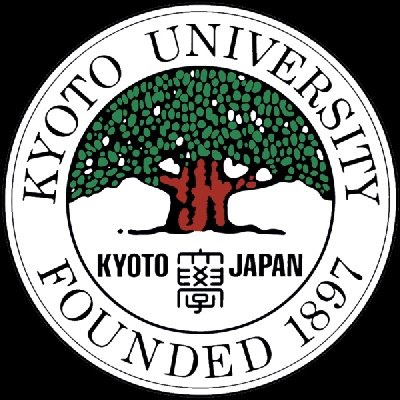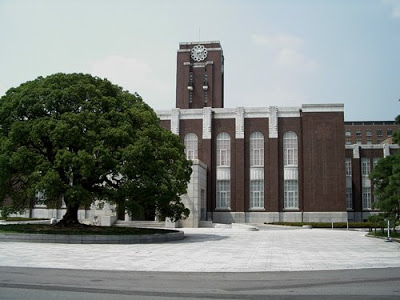Philosophy

University of Tokyo

We are all aware of the prestigious universities in the United States and many in England, but few are aware of the offerings of the far east...the two top ones being the University of Tokyo and Kyoto University.
Wikipedia:
As of 2008 some 30,000 students [2,100 of them are foreign] occupy campuses in Hongō, Komaba, Kashiwa, Shirokane and Nakano
The university was founded by the Meiji government in 1877 under its current name by amalgamating older government schools for medicine and Western learning. It was renamed "the Imperial University" in 1886, and then Tokyo Imperial University in 1887 when the Imperial University system was created. In 1947, after Japan's defeat in World War II, it assumed the original name again. With the start of the new university system in 1949, Todai swallowed up the former First Higher School (today's Komaba campus) and the former Tokyo Higher School, which henceforth assumed the duty of teaching first and second-year undergraduates, while the faculties on Hongo main campus took care of third and fourth-year students.
The University of Tokyo has since 2004 been incorporated as a "national university corporation" under a new law which applies to all national universities.
While nearly all academic disciplines are taught at the University, it is perhaps best known for its faculties of science, law, and literature (i.e., faculty of letters).
The University of Tokyo is widely thought of as being one of the most prestigious schools in many academic areas. Its rival schools are the other six of the Seven Universities, which were Imperial Universities before World War II. Its primary rival is considered to be Kyoto University, which has, in fact, produced more Nobel Prize winners.
University of Tokyo

 Kyoto University
Kyoto University
Wikipedia:
Kyoto University is a major national university in Kyoto, Japan. It is the second oldest university in Japan, and formerly one of the Imperial Universities of Japan. The university has a total of about 22,000 students enrolled in its undergraduate and graduate programs.
The university has three campuses in Yoshida, Kyoto; in Gokashō, Uji; and in Katsura, Kyoto.
Yoshida Campus is the main campus, with some laboratories located in Uji. The Graduate School of Engineering is currently under process of moving to the newly-built Katsura Campus.
Kyoto University has historically advocated a "spirit of freedom" in its academic activities. The university established itself as a premier research university with six Nobel Laureates and two Fields Medalists among its faculties and alumni. The university is also known as the home of the Kyoto School group of philosophers.
Kyoto University was ranked as the 22nd best university in the world in 2007 according to the Academic Ranking of World Universities. The Times Higher Education Supplement ranked Kyoto University as the 25th in the world and the 3rd in Asia in 2007.
The forerunner of the Kyoto University was the Chemistry School founded in Osaka in 1436, which, despite its name, taught physics as well. Later, the Third Higher School was established in the place of Seimi-kyoku in 1886, it then transferred to the university's present main campus in the same year.
Kyoto Imperial University as a part of the Imperial University system was established in June 18, 1897, using the Third Higher School's buildings. The higher school moved to a patch of land just across the street, where the Yoshida South Campus stands today. In the same year of the university's establishment, the College of Science and Technology was founded. The College of Law and the College of Medicine were founded in 1899, the College of Letters in 1906, expanding the university's activities to areas outside natural science.
After World War II, the current Kyoto University was established by merging the imperial university and the Third Higher School, which assumed the duty of teaching liberal arts as the Faculty of Liberal Arts. The faculty was dissolved with the foundation of the Faculty of Integrated Human Studies in 1992.
Kyoto University has since 2004 been incorporated as a national university corporation under a new law which applies to all national universities.
Despite the incorporation which has led to increased financial independence and autonomy, Kyoto University is still partly controlled by the Japanese Ministry of Education.
Kyoto University
Yogiro Hama
Paul Kazuo Kuroda
- Deceased--john Toll
John Toll October 24th, 1923 to July 15th, 2011 "University of Maryland's founding chancellor John Toll dies" He had been president of UM and later Washington College by Liz Bowie July 15, 2011|By The Baltimore Sun John Sampson Toll, a gifted physicist...
- A Bachelor Of Arts Degree From Your Couch?
Economically...a sound idea; socially...stinks. This dilutes the higher education experience and may promote a new, hybrid student. "University of California considers online bachelor's degree" The University of California hopes to become the country's...
- Lab Explosion At The University Of Missouri In Columbia, Missouri
Another university laboratory tragedy. Apparently, a tank of hydrogen exploded injuring four...one seriously. "Explosion at MU chemistry lab reportedly injures four" June 28th, 2010 The Kansas City Star An explosion at University of Missouri this afternoon...
- Academic Cutbacks Are Metastasizing
"Plan to shut leading philosophy course condemned by academics" Plans to shut one of the world’s leading university philosophy courses have sparked outrage among academics. by Graeme Paton May 9th, 2010 Telegraph.co.uk Professors claimed that a decision...
- Big Bucks For University Vice-chancellors
"Salaries soar for heads of British universities" More than 80 university heads, generally known as vice-chancellors, now earn more than the prime minister by David Leigh and Rob Evans March 14th, 2010 guardian.co.uk The income of thousands of the...
Philosophy
Far Eastern...University of Tokyo & Kyoto University

University of Tokyo

University of Tokyo/Hongō Campus
We are all aware of the prestigious universities in the United States and many in England, but few are aware of the offerings of the far east...the two top ones being the University of Tokyo and Kyoto University.
Wikipedia:
As of 2008 some 30,000 students [2,100 of them are foreign] occupy campuses in Hongō, Komaba, Kashiwa, Shirokane and Nakano
The university was founded by the Meiji government in 1877 under its current name by amalgamating older government schools for medicine and Western learning. It was renamed "the Imperial University" in 1886, and then Tokyo Imperial University in 1887 when the Imperial University system was created. In 1947, after Japan's defeat in World War II, it assumed the original name again. With the start of the new university system in 1949, Todai swallowed up the former First Higher School (today's Komaba campus) and the former Tokyo Higher School, which henceforth assumed the duty of teaching first and second-year undergraduates, while the faculties on Hongo main campus took care of third and fourth-year students.
The University of Tokyo has since 2004 been incorporated as a "national university corporation" under a new law which applies to all national universities.
While nearly all academic disciplines are taught at the University, it is perhaps best known for its faculties of science, law, and literature (i.e., faculty of letters).
The University of Tokyo is widely thought of as being one of the most prestigious schools in many academic areas. Its rival schools are the other six of the Seven Universities, which were Imperial Universities before World War II. Its primary rival is considered to be Kyoto University, which has, in fact, produced more Nobel Prize winners.
University of Tokyo

 Kyoto University
Kyoto UniversityWikipedia:
Kyoto University is a major national university in Kyoto, Japan. It is the second oldest university in Japan, and formerly one of the Imperial Universities of Japan. The university has a total of about 22,000 students enrolled in its undergraduate and graduate programs.
The university has three campuses in Yoshida, Kyoto; in Gokashō, Uji; and in Katsura, Kyoto.
Yoshida Campus is the main campus, with some laboratories located in Uji. The Graduate School of Engineering is currently under process of moving to the newly-built Katsura Campus.
Kyoto University has historically advocated a "spirit of freedom" in its academic activities. The university established itself as a premier research university with six Nobel Laureates and two Fields Medalists among its faculties and alumni. The university is also known as the home of the Kyoto School group of philosophers.
Kyoto University was ranked as the 22nd best university in the world in 2007 according to the Academic Ranking of World Universities. The Times Higher Education Supplement ranked Kyoto University as the 25th in the world and the 3rd in Asia in 2007.
The forerunner of the Kyoto University was the Chemistry School founded in Osaka in 1436, which, despite its name, taught physics as well. Later, the Third Higher School was established in the place of Seimi-kyoku in 1886, it then transferred to the university's present main campus in the same year.
Kyoto Imperial University as a part of the Imperial University system was established in June 18, 1897, using the Third Higher School's buildings. The higher school moved to a patch of land just across the street, where the Yoshida South Campus stands today. In the same year of the university's establishment, the College of Science and Technology was founded. The College of Law and the College of Medicine were founded in 1899, the College of Letters in 1906, expanding the university's activities to areas outside natural science.
After World War II, the current Kyoto University was established by merging the imperial university and the Third Higher School, which assumed the duty of teaching liberal arts as the Faculty of Liberal Arts. The faculty was dissolved with the foundation of the Faculty of Integrated Human Studies in 1992.
Kyoto University has since 2004 been incorporated as a national university corporation under a new law which applies to all national universities.
Despite the incorporation which has led to increased financial independence and autonomy, Kyoto University is still partly controlled by the Japanese Ministry of Education.
Kyoto University
Yogiro Hama
Paul Kazuo Kuroda
- Deceased--john Toll
John Toll October 24th, 1923 to July 15th, 2011 "University of Maryland's founding chancellor John Toll dies" He had been president of UM and later Washington College by Liz Bowie July 15, 2011|By The Baltimore Sun John Sampson Toll, a gifted physicist...
- A Bachelor Of Arts Degree From Your Couch?
Economically...a sound idea; socially...stinks. This dilutes the higher education experience and may promote a new, hybrid student. "University of California considers online bachelor's degree" The University of California hopes to become the country's...
- Lab Explosion At The University Of Missouri In Columbia, Missouri
Another university laboratory tragedy. Apparently, a tank of hydrogen exploded injuring four...one seriously. "Explosion at MU chemistry lab reportedly injures four" June 28th, 2010 The Kansas City Star An explosion at University of Missouri this afternoon...
- Academic Cutbacks Are Metastasizing
"Plan to shut leading philosophy course condemned by academics" Plans to shut one of the world’s leading university philosophy courses have sparked outrage among academics. by Graeme Paton May 9th, 2010 Telegraph.co.uk Professors claimed that a decision...
- Big Bucks For University Vice-chancellors
"Salaries soar for heads of British universities" More than 80 university heads, generally known as vice-chancellors, now earn more than the prime minister by David Leigh and Rob Evans March 14th, 2010 guardian.co.uk The income of thousands of the...
